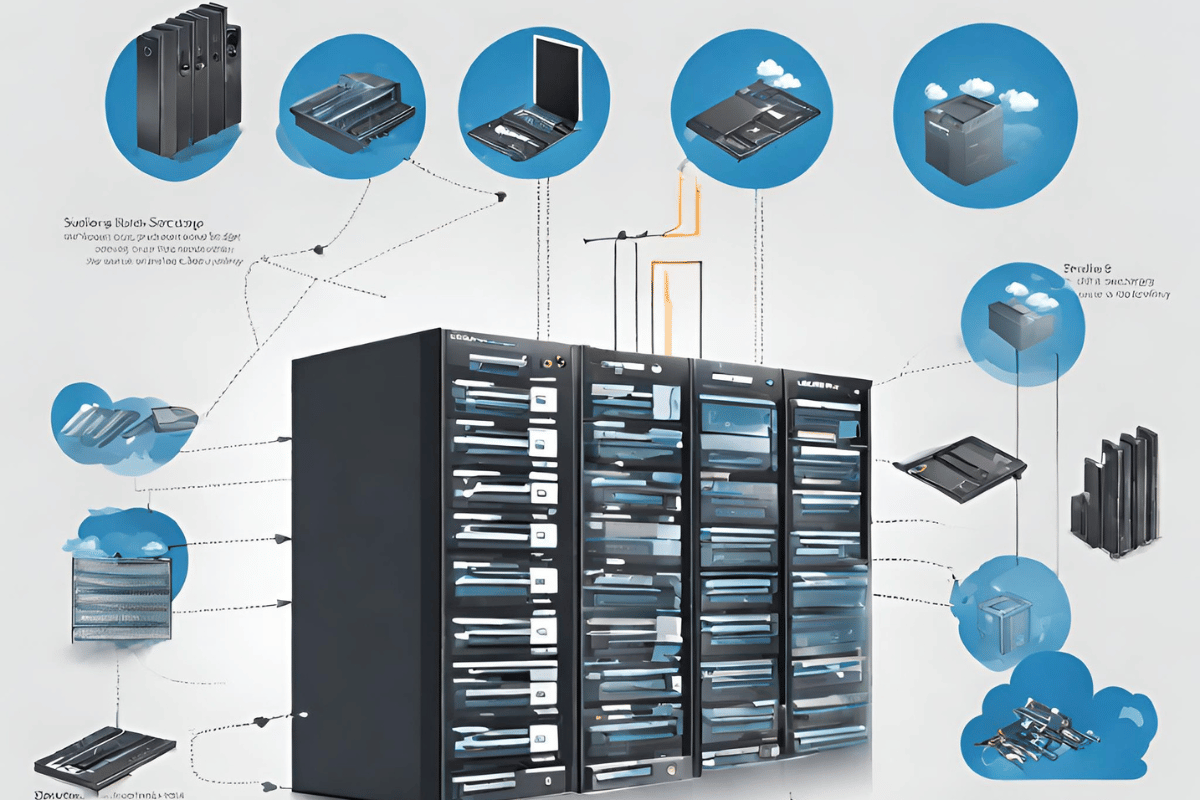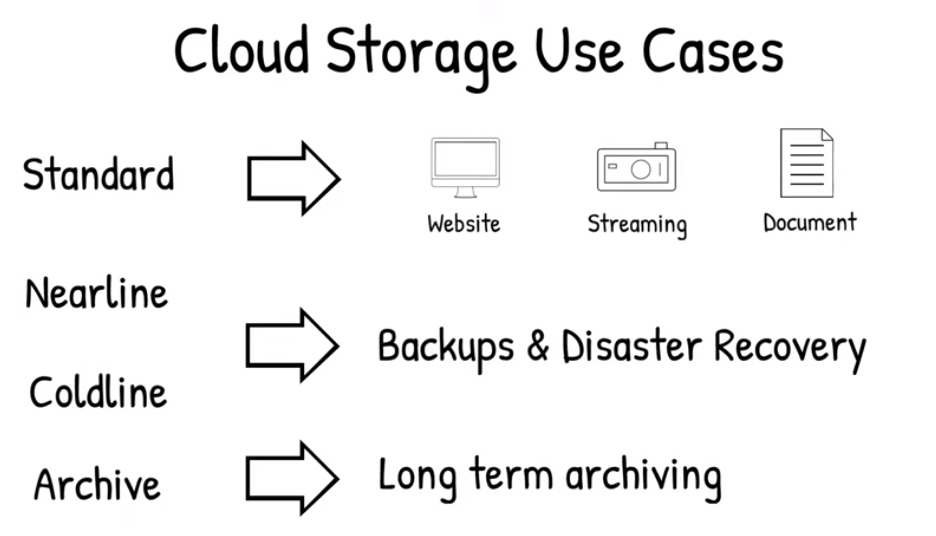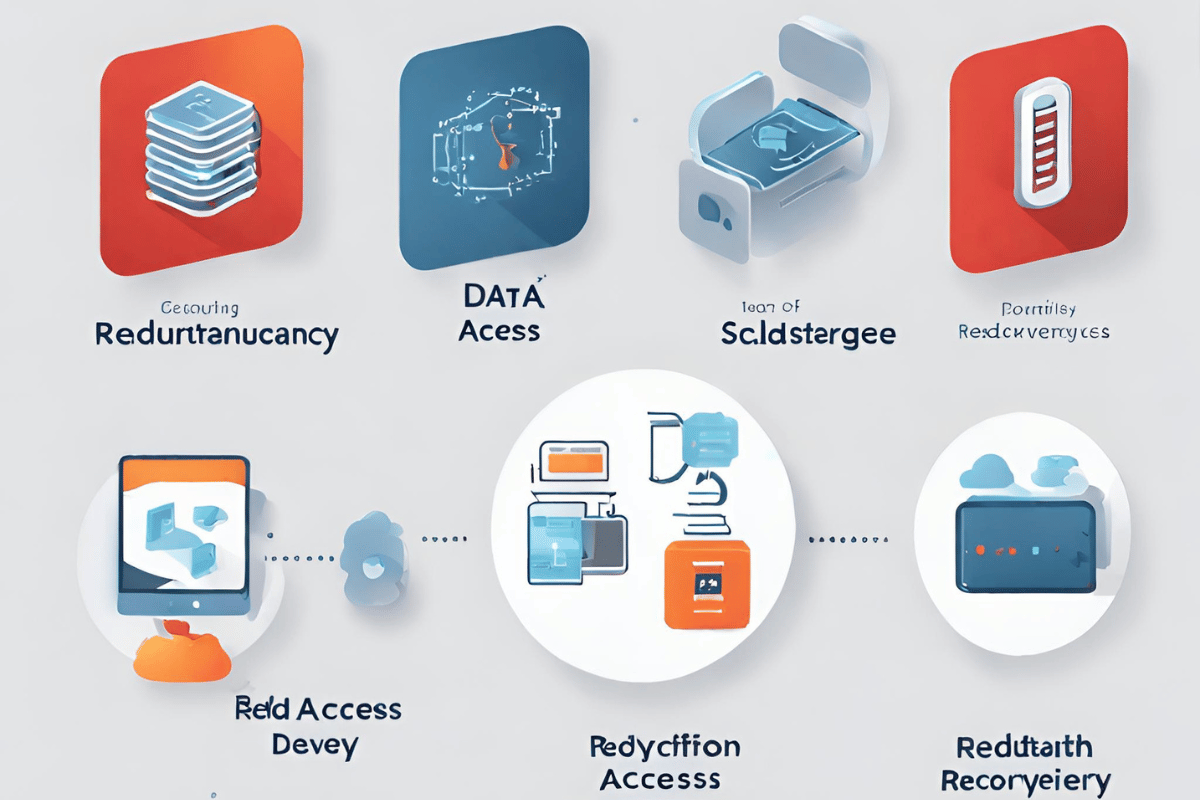Data storage is the process of preserving digital data on various media like hard drives, SSDs, and cloud servers, ensuring easy retrieval and protection against data loss. Traditional methods, such as hard drives and physical servers, have reliability but lack scalability. In contrast, modern solutions like cloud storage, SSDs, and NAS offer enhanced features. Cloud storage, for example, provides scalability, data redundancy, collaboration, and cost-efficiency. SSDs are known for their speed, durability, and energy efficiency. NAS devices offer centralized storage, backup solutions, remote access, and media streaming.
What is Data Storage?

Data storage refers to storing digital data on various media types, such as hard drives, solid-state drives (SSDs), and cloud servers. It involves preserving digital information in a way that allows for easy retrieval and protection against data loss.
Traditional vs. Modern Data Storage
Traditional Data Storage
Traditional data storage methods like hard drives and physical servers have been the go-to options for many years. They offer reliability but often lack the scalability and speed required in today’s fast-paced world.
Modern Data Storage Solutions
Modern data storage solutions, including cloud storage, solid-state drives (SSDs), and network-attached storage (NAS), have revolutionized how we store and access data. Let’s explore these options in detail.
Cloud Storage:

The Rise of Cloud Storage
Cloud storage has gained immense popularity due to its convenience and accessibility. It allows users to store data remotely and access it anywhere with an internet connection.
Benefits of Cloud Storage
- Scalability: Cloud storage can easily accommodate your growing data needs.
- Data Redundancy: Your data is replicated across multiple servers, reducing the risk of data loss.
- Collaboration: Cloud storage facilitates seamless collaboration among team members.
- Cost-Efficiency: Pay only for the storage you use, eliminating the need for expensive hardware.
Solid-State Drives (SSDs):
Solid-state drives (SSDs) are data storage devices that store data in flash memory. They have gained popularity for their speed and reliability compared to traditional hard drives.
Advantages of SSDs
- Blazing Fast Speed: SSDs offer significantly faster data read and write speeds, reducing loading times.
- Durability: SSDs are less prone to physical damage since they have no moving parts.
- Energy Efficiency: SSDs consume less power, making them environmentally friendly.
- Quiet Operation: SSDs operate silently, a stark contrast to the audible spinning of traditional hard drives.
Network-Attached Storage (NAS):
Network-attached storage (NAS) devices are specialized storage solutions for sharing data across a network. They are an excellent choice for businesses and home networks.
Key Features of NAS
- Centralized Storage: NAS devices consolidate data storage, making it easy to access and manage.
- Data Backup: Many NAS systems offer automated backup solutions for added data security.
- Remote Access: NAS allows you to access your files remotely, enhancing flexibility.
- Media Streaming: Some NAS devices can also serve as media servers, streaming content to various devices.
Better Features for Enhanced Data Storage:

1. Data Redundancy and Backup
One of the most crucial features of data storage is redundancy and backup. With the risk of hardware failures, accidental deletions, or data corruption, it’s essential to have a system that ensures data integrity. Many storage solutions offer automatic backup options locally and in the cloud.
2. Data Encryption
Privacy and security are paramount in the digital world. Modern data storage solutions often have built-in encryption features to safeguard your data. This ensures that even if your storage device falls into the wrong hands, your data remains inaccessible without the encryption key.
3. Remote Access and Synchronization
In today’s fast-paced world, accessing your data from anywhere is a game-changer. Many storage solutions provide remote access and synchronization options, allowing you to work on your files from any device with an internet connection.
4. Scalability
Scalability is a vital feature, especially for businesses. As data storage needs grow, it’s crucial to have a solution that can scale up seamlessly. Many cloud storage providers offer pay-as-you-go plans, allowing you to increase your storage capacity as needed.
5. Data Recovery
Accidents happen, and data can be lost. However, advanced data storage solutions often include data recovery options. Whether it’s recovering deleted files or restoring a system to a previous state, these features can be a lifesaver.
Innovative Data Storage Technologies:
Shingled Magnetic Recording (SMR)
SMR technology increases the storage capacity of HDDs by overlapping data tracks. It’s a cost-effective solution for businesses needing high-capacity storage.
Non-Volatile Memory Express (NVMe)
NVMe SSDs are significantly faster than traditional SATA SSDs, making them ideal for lightning-fast data access applications.
Software-Defined Storage (SDS)
SDS allows businesses to abstract storage resources from physical hardware, providing greater flexibility and agility in managing data.
The Future of Data Storage:
Quantum Storage
Quantum storage, harnessing the power of quantum mechanics, can revolutionize data storage by offering unparalleled capacity and security.
Edge Computing
Edge computing, which brings data processing closer to the data source, will demand innovative storage solutions capable of handling the unique requirements of edge devices.
Choosing the Right Data Storage Solution:
Assess Your Needs
Start by assessing your data storage requirements. Consider factors like the amount of data you have, the type of data (documents, photos, videos), and how you plan to access it.
Budget
Determine how much you’re willing to invest in data storage. Remember that better features often come with a higher price tag.
Security
If data security is a top priority, look for solutions that offer robust encryption and security features. This is especially important for businesses dealing with sensitive information.
Scalability
Choose a solution that can grow with you. Scalability ensures that you won’t outgrow your storage system too quickly.
User-Friendly Interface
An intuitive and user-friendly interface can significantly impact your storage experience. Look for solutions that are easy to set up and navigate.
Conclusion
Data storage has evolved significantly, offering better features that enhance our digital lives. Whether you choose SSDs for speed, cloud storage for accessibility, or NAS for network-wide storage, the options are vast. Assess your needs, consider your budget, and prioritize security when selecting the right data storage solution.
Frequently Asked Questions:
What are the differences between traditional and modern data storage methods?
Traditional data storage methods, like hard drives and physical servers, offer reliability but may lack scalability and speed. Modern data storage solutions, such as cloud storage and SSDs, provide greater scalability, accessibility, and speed, making them more suitable for today’s fast-paced digital world.
What are the benefits of using cloud storage?
Cloud storage offers several advantages, including scalability to accommodate growing data needs, data redundancy to minimize the risk of data loss, seamless collaboration features, and cost-efficiency by eliminating the need for expensive hardware.
What are the key features when choosing a data storage solution?
When selecting a data storage solution, consider features like data redundancy and backup, data encryption for privacy and security, remote access and synchronization for flexibility, scalability to accommodate growth, and data recovery options in case of accidents.
Can you explain Shingled Magnetic Recording (SMR) technology?
SMR technology is used to increase the storage capacity of HDDs by overlapping data tracks. It’s a cost-effective solution for businesses needing high-capacity storage without investing in entirely new storage infrastructure.
What are Non-Volatile Memory Express (NVMe) SSDs, and why are they popular?
NVMe SSDs are solid-state drives offering significantly faster data read and write speeds than traditional SATA SSDs. They are popular for applications requiring lightning-fast data access, improving overall system performance.
What is the significance of Quantum Storage in the future of data storage?
Quantum storage, based on quantum mechanics, holds the potential to revolutionize data storage by offering unmatched capacity and security. It could enable the storage of vast amounts of data with unprecedented encryption capabilities.
